Faculty Members
The Advisory Board of the PhD Programme consists of the professors listed in this page. Luca De Marchi is the Coordinator.
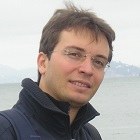
Luca De Marchi
Electronics, Signal processing, Ultrasonics, Embedded systems.
Luca De Marchi is currently the Coordinator of the EIT4SEMM Ph.D. program. He received the Dr.Eng. and Ph.D. Degrees in electronic engineering respectively in 2002 and 2006 from the University of Bologna. He prepared his Master Thesis in Digital Signal Processing and ASICs Design at the technical University of Berlin (TUB). At the end of 2002, he joined the Department of Electronics, Computer Sciences and systems (DEIS) at the University of Bologna, since 2003 he is also collaborating with the Advanced Research Center for Electronic Systems (ARCES). In 2010, he was visiting researcher at the Vibration and Wave Propagation Lab, Georgia Institute of Technology (Atlanta, USA).

Paolo Castaldi
Health Monitoring, Fault Detection and Isolation, Aerospace Systems, Underwater System, Civil Infrastructures, Renewable Energy Conversion Systems, Precision Agriculture
Paolo Castaldi received the Master Degree cum laude in Electronic Engineering and the Ph.D in System Engineering from UNIBO. He is currently Associate Professor at DEI-UNIBO. He is a vice chair of the International Federation of Automatic Control (IFAC) Technical Committee on Aerospace. He is author of a research book, several book chapters and 140 articles on International Journals and Congress Proceedings. He has been plenary speaker, organizer and program chair. He has been coordinator and member of several research and industrial projects. He has been supervisor of 3 Ph.D. students. He is Associated Editor of Control Engineering Practice and Aerospace Engineering. He has the license as Private Pilot (PPL) and for piloting drones till 24 kg. He has been coordinator of several Permit to Fly procedures.
Research interests: Heath Monitoring (Fault Detection and Isolation) of: Aerospace and Underwater Systems; Wind Turbine and Wind Farm; Renewable Energy Conversion Systems; Civil Infrastructures; Industrial Processes. The theoretical approach adopted include differential geometry approach, fractional derivative based approach, adaptive filtering, system identification, fuzzy logic, neural networks and machine learning and their combinations. Furthermore: precision agriculture crop monitoring by using Aerial Vehicles and Multispectral Camera.
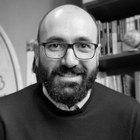
Giovanni Castellazzi
Finite Element Method, Masonry structures, Stress recovery, Computational Mechanics
Giovanni Castellazzi is an Associate Professor in Structural Mechanics at the Department of Civil, Chemical, Environmental, and Materials Engineering - University of Bologna and Deputy President of the Italian Association of Composites for Civil Engineering applications (AICO).
He was a Post-doctoral Fellow at the University of California San Diego (UCSD) and completed his Ph.D. in structural mechanics at the University of Bologna. His research interests lie broadly in the field of computational mechanics but are primarily focused on the area of masonry structures: from coupled models for the study of mechanical degradation of porous materials to computational tools for the seismic assessment of masonry structures.
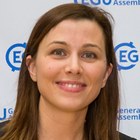
Serena Ceola
Hydrological and anthropogenic interactions, Flood exposure, Remote sensing, Ecohydrology.
Serena Ceola is Assistant Professor at the University of Bologna since November, 2014. She holds a PhD in Environmental Engineering from the Ecole Polytechnique Fédérale de Lausanne (2012).
Her research interests include: analysis of remote sensing data for water resources sustainability and water-related risks, flood risk assessment, analysis of anthropogenic and hydrologic interactions. She also has a strong experience in stochastic analysis of hydrologic and hydraulic variables, ecohydrological experimental activity and stream ecology.
In 2016, she won the Evangelista Torricelli Award delivered by the Italian Hydraulic Group (GII). In 2017, she won the Canada Italy Innovation Award delivered by the Embassy of Canada and spent a period as a visiting researcher at the University of Saskatchewan. In 2019, she won, the Hydrological Sciences Division Outstanding Early Career Scientist Award delivered by the European Geosciences Union.
She is author of more than 20 scientific publications in referred journals and conference proceedings. She presented more than 50 oral or poster contributions in major national and international conferences.
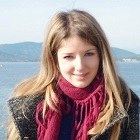
Valentina Ciriello
Environmental fluid mechanics and hydrology, Sustainability, Stochastic analysis.
Valentina Ciriello is Associate Professor of Hydraulics at the University of Bologna since 2019. She authored more than 70 scientific publications among conference proceedings and papers in international journals. Research interests include fluid mechanics, hydrology, water-energy-agriculture nexus and urban hydraulics. She also has experience in risk and sensitivity analysis, meta-modeling and optimization. She acts as local coordinator for a Research Project of National Interest (PRIN2017) on fluid dynamics to predict cardiovascular diseases and for the H2020 Project CLARA on climate forecast. She has been involved in several public engagement events to raise public awareness on a sustainable use of water resources and climate change. She is Associate Editor of Stochastic Environmental Research and Risk Assessment (Springer) and Journal of Hydrology (Elsevier). She collaborates with several foreign research institutes including Stanford and the Weizmann Institute of Science.

Valerio Cozzani
Risk analysis, Safety assessment, Sustainable design and technology innovation in chemical processes, Environmental sustainability
Valerio Cozzani is Professor and Director of academic programs in Chemical Engineering at University of Bologna. He received a MSc in Chemical Engineering and a PhD in Chemical Engineering from University of Pisa, in Italy. He was research fellow at the Major Accident Hazards Bureau, ISIS, EC Joint Research Centre, and Lecturer at the Faculty of Engineering of Pisa University.
At University of Bologna he leads the laboratory of industrial safety and environmental sustainability, affiliated to the IChemE Safety Centre and coordinates several courses for professionals in the fields of industrial safety and design of Oil&Gas facilities.
He has about 20 years of research experience in the fields of risk analysis and safety assessment, sustainable design and technology innovation in chemical processes. He coauthored more than 130 peer-reviewed publications.
Prof. Cozzani is Associate Editor of Safety Science, member of the Editorial Boards of the Journal of Hazardous Materials and of the Journal of Loss Prevention in the Process Industries, chair of the ESRA Technical Committee on Chemical and Process Industry, member of the executive board of the European Technology Platform on Industrial Safety and Italian Delegate in the EFCE Working Party on Loss Prevention in the Process Industry.
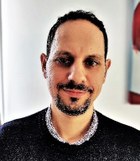
Marco Crescentini
Sensors, Instrumentation, Microelectronics, IoT, Medical devices
Marco Crescentini received the Dr.Eng. degree in electronic engineering and the Ph.D. degree in information and communication technologies from the University of Bologna in 2008 and 2012, respectively. In 2009, he joined Infineon Technologies Austria in Villach as an intern. Since 2016, he has been a Researcher/Assistant Professor of instrumentation and measurement with the Department of Electrical, Electronic and Information Engineering “Guglielmo Marconi,” University of Bologna, Cesena Campus, Italy. In the same year, he also joined the Advanced Research Center for Electronic Systems (ARCES) and he currently is a scientific leader in the STM-Unibo Joint laboratory. His current research interests include the design of high-accuracy, low-noise, and broadband instrumentation for either biomedical or energy applications.

Vittorio Degli Esposti
Electromagnetic Propagation, Scattering, Wireless Systems.
Vittorio Degli-Esposti is Full Professor with the “Dipartimento di Ingegneria Elettrica, Elettronica e dell’Informazione” (DEI) of the Alma Mater Studiorum - Università di Bologna.
From January 2015 to December 2016 he’s been Director of Research at Polaris Wireless Inc., Mountain View, California, USA. He has been recipient of the “2023 EurAAP Propagation Award” of the European Association on Antennas and Propagation.
He has been Post-Doc Researcher in 1998 at Polytechnic University, Brooklyn, New York (now NYU Tandon School of Engineering) in the group led by Professor H. L. Bertoni. He has been Visiting Professor at Helsinki University of Technology (now Aalto University), and Tongji University, Shanghai, in 2006 and 2013, respectively and participated in several European Research Projects including many European Cooperation Actions (COST), the European Networks of Excellence NEWCOM and NEWCOM++, and other 7th framework and Horizon Europe Projects. He is a Mercator Fellow of the Deutsche Forschungs Gemeinschaft (DFG), in affiliation with the 4-CAD project.
He has been Chair of the Propagation Working Group of the European Association on Antennas and Propagation (EuRAAP) and of WG1 of COST Action CA20120 “Interact”. He has been Chair of the URSI International Symposium on Electromagnetic Theory (URSI-EMTS 2025) Vice-Chair of the European Conference on Antennas and Propagation (EuCAP), editions 2010 and 2011, Short-Courses and Workshops Chair of the 2015 edition, Convened Sessions Chair of the 2023 edition, Invited Speaker at EuCAP 2014, Invited Speaker at the International Symposium on Antennas and Propagation (ISAP) 2020 and Short-Courses Chair of the European Conference on Networks and Communications, (EuCNC) 2020.
He has been co-founder and lecturer of the biennial Courses for PhD students and Researchers “Short range radio propagation” and “Mobile Radio Propagation for 5G and Beyond" of the European School of Antennas (https://www.euraap.org/esoa-courses).
He is author or co-author of over 180 peer-reviewed technical papers and co-inventor of 7 international patents in the fields of applied electromagnetics, radio propagation and wireless systems. He is Senior Member of the IEEE and Editor of the IEEE Transactions on Vehicular Technology.
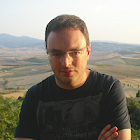
Marco Di Felice
Computer Science, Mobile systems and applications, Wireless networking, Internet of Things.
Marco Di Felice is Associate Professor at the Department of Computer Science and Engineering of the University of Bologna, Italy. He received his Master and Ph.D. degree in Computer Science respectively in 2004 and 2008, both from the University of Bologna. From August 2007 to December 2007 and April 2008 to August 2008 he was a visiting researcher at the Broadband Wireless Networking Laboratory, Georgia Institute of Technology, Atlanta, USA. From September to December 2009, he was a visiting researcher at the Northeastern University, Boston, USA. He authored more than 80 international journal and conference papers on wireless and mobile systems. Since August 2014, he is Associate Editor of the Ad Hoc Network journal (Elsevier), and member of the technical committee of the Computer Communications journal (Elsevier). He joint the following national and European research projects: PRIN 2006, PRIN 2009 STEM-NET, ARTEMIS Internet-of-Energy, ARTEMIS Arrowhead. His research activity is focused on the design, analysis and performance evaluation of Wireless and Mobile protocols and applications, including cognitive radio-based systems, device-to-device communication systems, and the Internet of Things (IoT). On this latter, he is interested on aspects of network protocol design and network self-configuration, support to multi-hop and Machine-to-Machine (M2M) communication, context-aware and mobile computing.
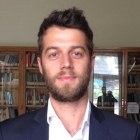
Alessio Domeneghetti
Flood hazard and risk modelling, Flood damage analysis, Remote sensing for hydrological applications, Hydraulic modelling
Alessio Domeneghetti is Senior Assistant Professor (since May 2019) at the University of Bologna, DICAM (Dept. of Civil, Chemical, Environmental and Materials Engineering) and holds a Ph.D. in Hydraulic and Structural Engineering (2012) from the University of Bologna.
His expertise mainly covers flood hazard modelling and flood damage estimation at different scale and contexts, as well as remote sensing applications for hydrological and hydraulic purposes. In these fields of research, he is involved in several European and National research programs, collaborating also with many distinguished Universities and Research Institutes around the World. He is currently involved in several research activities dealing with: flood risk mitigation under climate change scenarios (e.g., H2020 project - OPERANDUM -OPEn-air laboRAtories for Nature baseD solUtions to Manage environmental risks), efficient water usage in agriculture (H2020 SWAMP Project) and EU Flood Directive application (Project Responsible for DICAM in the research agreement funded by the Po River Basin Authority).
He is author and co-author of more than 40 scientific publications in peer-reviewed journals and conference proceedings. He is (has been) part of the Editorial Board of the Hydrological Science Journal (Journal of Hydrology and Remote Sensing). He is member of the Italian Hydrological Society, European and American Geophysical Union.

Nicholas Fantuzzi
Mechanics of solids and structures, Composite materials and structures, Computational mechanics, Fatigue and fracture mechanics.
Nicholas Fantuzzi is Senior Assistant Professor of Structural Mechanics. He received MSc in Civil Engineering and PhD in Structural Engineering and Hydraulics from University of Bologna. He holds the Italian National Academic Qualification as Associate Professor in Mechanics of Solids and Structures.
His research interests are mechanics of solids and structures, fracture mechanics, implementation of numerical methods for the design of structures, application of composite materials in offshore engineering, and design and strengthening of offshore components with numerical simulations.
He has been visiting professor at City University of Hong Kong, Chongqing University and University of Rijeka. Winner of 3 international awards. He participated in the organization or co-chaired 14 International Conferences on composite structures and mechanics of solids and structures. He has been invited speaker at 5 international conferences. Section Editor-in-Chief of “Mathematical and Computational Applications”, MDPI Publishing. Reviewer on more than 90 international journals. Author of more than 100 international peer reviewed journal papers, 9 books and more than 80 abstracts in national and international conferences.

Dario Frascari
Adsorption & Ion exchange, Anaerobic digestion, Bioprocesses, Waste and wastewater valorization, Nutrient recovery
Dario Frascari is Associate Professor at the University of Bologna and holds a Ph.D. in Chemical & Environmental Engineering. He teaches "Plants for the treatment of wastewater and flue gas", "Technologies for environmental protection" and "Laboratory of chemical and biochemical reactors" to Chemical and Environmental Engineering students. He has been the scientific coordinator of the MADFORWATER Horizon 2020 project, focused on the development of technologies and management tools for wastewater treatment and reuse in North Africa. He participated to 7 EU research projects and 7 national research projects. He also participated to 6 contracts of applied research commissioned by private companies, mainly in the fields of wastewater treatment and remediation of contaminated sites. His research focuses on the development, modeling and scale-up of processes for the treatment and valorization of wastes and wastewater, with specific focus on (i) the recovery of nutrients and antioxidants by adsorption and extraction, (ii) the bioproduction of biofuels and building blocks for the chemical industry using waste and byproducts as substrates, and (iii) the anaerobic digestion of different types of wastes and wastewaters. He also worked on the biodegradation of chlorinated hydrocarbons in groundwater. Together with Prof. Toscano, he represents UNIBO in the Water Europe platform. He published 41 articles in international scientific journals with IF, 8 chapters in international series and books and 18 extended abstracts in the proceedings of international journals. He co-edited the book “Development and scale-up of technologies for wastewater treatment and reuse in Mediterranean African countries: the MADFORWATER project”. He has a Scopus H-index equal to 19.
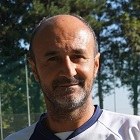
Stefano Gandolfi
GNSS – Geomatics – Monitoring of strutcure and territory (geodynamics – landslides – subsidence)
Stefano Gandolfi received the Degree in Physics (with laude) in 1993 and the Ph.D. in Geodetic and Topographic Sciences from the University of Bologna in 1997. He is currently full professor of Geomatics at the University of Bologna and teacher of two courses particularly addressed to monitoring aspects of structures and territory both for MSc in Civil Engineering and Environmental Engineering programs.
He was member of Scientific Committee of SIFET (Italian Society of photogrammetry and Topography) from 2007 to 2018 and now is member of the Board of the same society. He was Chair of ASITA Scientific Committee (Italian Federation of the scientific associations of Environmental and Territorial Information) from 2011 to 2018 and now is member of the Board of the same Association.
He is associate editor of Applied Geomatics (Springer) since 2008 and referee for several journals that operate in the framework of geodesy and geomatics. He is member of the GTA (Thematic Group of the University of Bologna) space and referent for GNSS technology.
His scientific interests are concentrated on the definition and maintenance of reference frames and on the use of GNSS data for monitoring deformation processes of structures, territory and at global scale using different geomatics technologies but with a particular interest in GNSS. He was also involved 6 Antarctic Expeditions of the Italian National Program for Antarctic Research where he has developed research activities on Geodesy and GNSS mainly for geodynamics and glaciological purposes.
Is author and coauthor of more than 70 papers in international journals or Conference proceedings and others contributes in national conferences or journals for an overall amount of about 140 contributes.
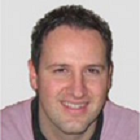
Andrea Giorgetti
Telecommunications, Wireless sensor networks, Statistical signal processing, Cyber-physical systems.
Andrea Giorgetti is Associate Professor at the Department of Electrical, Electronic, and Information Engineering (DEI) of the University of Bologna. In Spring 2006, he was with the Laboratory for Information and Decision Systems (LIDS), Massachusetts Institute of Technology (MIT), Cambridge, MA, USA. Since then, he has been a Research Affiliate for LIDS, MIT. His research interests include ultrawide bandwidth communications systems, active and passive localization, wireless sensor networks, and cognitive radio. He has co-authored the book entitled Cognitive Radio Techniques: Spectrum Sensing, Interference Mitigation, and Localization (Artech House, 2012). He served the IEEE Communication Society as Technical Program Co-Chair for the following symposia: the Int. Symp. on Wireless Comm. Systems (ISWCS 2014), Barcelona, Spain, August 2014; the Cognitive Radio and Networks Symp. (Lead Co-Chair) at GLOBECOM 2013; the Cognitive Radio and Networks Symp. at ICC 2013; the MAC track at WCNC 2009; the Wireless Net. Symp. at ICC 2008. He was the scientific responsible of the University of Bologna research unit for the project PRIN 2009: “Robust and easy to deploy wireless sensor networks for landslides integrated monitoring,” (Oct. 2011 - Oct. 2013). He is the Chair of the IEEE Communications Society’s Radio Communications Technical Committee. He served as an Editor for the IEEE Transactions on Wireless Communications (2012-2016), and as an Editor for the IEEE Communications Letters (2012-2015).
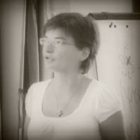
Elena Gnani
Nanoelectronics, Low-Power devices, Energy-efficient architectures, Emerging technologies.
Elena Gnani, actually Director of ARCES Research Center of University of Bologna, received the M.S. degree in Electrical Engineering “summa cum laude” and the Ph.D degree in Electrical Engineering and Computer Science in 2003 with a dissertation entitled “Physical models for MOS nanostructures”, both from the University of Bologna. In 2014 she became Associate Professor at the University of Bologna where she is involved in research activities concerning the physics, modeling, design and the characterization of advanced CMOS, beyond-CMOS transistors, quasi ballistic transport in nanoMOSFETs, and carrier injection in non-volatile memory cells. She was involved in several European Projects and has been the principal investigator in the research projects Futuro in Ricerca (FIRB 2010) “Novel device and circuit concepts for energy-efficient” funded by the Italian Ministry of University. Her research activities have been carried out in cooperation with worldwide semiconductor research centers and semiconductor industries, including EPFL di Losanna (Switzerland), Forschungszentrum Jülich (Germany), CEA-LETI di Grenoble (France), IBM Zurigo, ETHZ Zurigo (Switzerland), Institute of Microelectronics (IME, Singapore), Infineon Technologies AG, KTH Royal Institute of Technology (Sweden), IHP - Innovations for High Performance Microelectronics (Germany), ST-Microelectronics (France) e Texas Instruments (USA). E. Gnani is author or co-author of more than 180 papers published in referred international journals and in proceedings of major international conferences, and of several invited contributions.

Alessandro Marzani
Structural mechanics, NDE and SHM, Smart structures, Ultrasonic guided wave, Metamaterials.
Alessandro Marzani is a Professor of Structural Mechanics and is currently the vice-coordinator of the EIT4SEMM Ph.D. program. He received an M.Sc. in Structural Engineering from the University of California, San Diego, USA, and an M.Sc. (Laurea) in Civil Engineering from the University of Bologna, Italy. In 2005 he obtained a Ph.D. in Structural Engineering from the University of Calabria, Italy.
Dr. Marzani has wide experience in non-destructive evaluation techniques of materials and structures, structural monitoring, linear and non-linear ultrasonic guided wave propagation, structural optimization, and structural identification strategies. His recent research looks also at structured materials for wave propagation control (metamaterials). He has been the coordinator for the University of Bologna of the EU FP7 project “Smart Intelligent Aircraft Structures – SARISTU” and PI of two research contracts on the estimation of unknown parameters in oil and gas supply networks in collaboration with ENI SpA.
Dr. Marzani is a LEVEL 3 for NDT testing based on guided waves (UNI EN 473 e ISO 9712), holds two patents on structural monitoring and management, and actively cooperates with public authorities on standardization issues.

Stefano Mattoccia
Computer vision, 3D vision, Machine learning, Embedded systems.
Stefano Mattoccia is Associate Professor of computer architecture, logic design and embedded systems at the Department of Computer Science and Engineering, School of Engineering and Architecture, University of Bologna.. He received a M.Sc. in Electronic Engineering and a Ph.D. in Computer Science and Engineering from the University of Bologna, in 1997 and 2002 respectively. His research interests include: computer vision, 3D vision, machine-learning, embedded vision and applications of computer vision. He regularly serves as reviewer for major international conferences and journals.
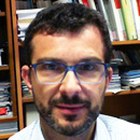
Claudio Mazzotti
Structural strengthening, composite materials, dynamic identification, durability and long term behavior of structures
Claudio Mazzotti is Associate Professor of Structural Engineering and is currently the Head of the Interdepartmental industrial research Center Building and Construction of the University of Bologna. In 2001 he received the Ph.D. in structural engineering from the University of Trento. He was Coordinator of the master degree programmes in Civil Engineering at the University of Bologna from 2015 to 2016. He is associate editor of ISRN Civil Engineering, Curved and Layered Structures and Journal of Engineering.
Since 2008 Dr. Mazzotti is a RILEM member and actively participates in a number of Technical Committees concerning fiber reinforced concrete and composite materials. He is member of the FIB task group 9.3 on FRP Reinforcement for concrete structures. He has a wide experience on structural strengthening of existing structures with composite materials, on the development of advanced materials and on dynamic identification of structures. He is actively involved in the analysis of the durability and long term behavior of structures and materials. He is the coordinator for the University of Bologna of the Emilia Romagna project Mater_sos on development and management of sustainable materials. He participates to the Emilia Romagna project Infrasafe Intelligent monitoring of safe infrastructures.
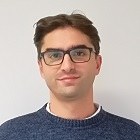
Matteo Minelli
Chemical Engineering, Polymers, Membranes, Gas and vapor sorption and transport
Matteo Minelli is Associate Professor in Chemical Engineering at University of Bologna. He received a MSc in Chemical Engineering and a PhD in Chemical Engineering from University of Bologna, in Italy.
He works in the Diffusion in Polymers and Membrane Separation research group at University of Bologna on the development and the characterization of innovative polymer systems and composites for advanced applications, from barrier materials for packaging to membranes for gas separation. He has more than 10 years of research experience in the field of gas and vapor solubility, diffusivity and transport in polymers, both from the experimental and the modeling point of view. He has several collaboration with relevant and well known universities and research institutes all around the world.
He coauthored more than 50 peer-reviewed publications, and he is reviewer for several international journals of high impact in Chemical Engineering and Material Science.
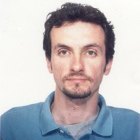
Marco Patella
Data processing systems, Non-conventional databases, Big Data management, Multimedia database systems.
Marco Patella is associate professor of information processing systems at DISI (department of computer science and engineering). His scientific activity is mainly focused on the efficient resolution of queries in non-conventional database systems. In this context, he obtained significant results in the design and theoretical analysis of access methods, in the design of algorithms for query processing and management of image databases, in preference-based queries, and in the management of Big Data. He was responsible for research contracts funded by the Italian government and by private institutions, mostly focused on management of data in many application domains, including cultural heritage (2007-2009), genomics (2011-2013), Big Data analysis for cyber security (2015-2017), and data analytics for condition-based maintenance (2017-). He is co-author of more than 50 papers published in the most important international journals and conference proceedings in the database field.

Davide Rossi
Systems on chip, Digital signal processors, Machine learning, Low-power architectures, Embedded systems
Davide Rossi, received the PhD from the University of Bologna, Italy, in 2012 where he currently holds an assistant professor position. His research interests focus on energy efficient digital architectures in the domain of heterogeneous and reconfigurable multi and many-core systems on a chip. This includes architectures, design implementation strategies, and runtime support to address performance, energy efficiency, and reliability issues of both high end embedded platforms and ultra-low-power computing platforms targeting the IoT domain. In these fields he has published more than 100 papers in international peer-reviewed conferences and journals. He is recipient of Donald O. Pederson Best Paper Award 2018, - 2020 IEEE Transactions on Circuits and Systems Darlington Best Paper Award, 2020 IEEE Transactions on Very Large Scale Integration Systems Prize Paper Award.
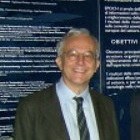
Tullio Salmon Cinotti
Computer Science, Interoperability of embedded systems, Architecture for semantic events processing, Internet of Things.
Tullio SALMON CINOTTI is Professor Alma Mater and Adjunct Professor of computer architecture and logic design. He has been Director of ARCES, the University of Bologna “Ercole De Castro” Research Center on electronic systems participating to this PhD Program. He has a long-standing research and design experience on embedded devices with current focus on Internet of Things, Web of Things and architectures for semantic event processing. He was supervisor/tutor of many PhD candidates paving their way to brilliant academic or corporate careers. He was responsible for research contracts funded by the EU (e.g. ARTEMIS JU, EIT Digital) and by private institutions, mostly focused on ambient intelligence and on interoperability platforms for ecosystems of heterogeneous interacting devices in many application domains, including archaeological sites and museums (2000-2008), buildings and indoor spaces (2009-11), remote assistance and tele-health (2010-13), electric mobility (2011-14), energy efficiency (2013-17). He is co-author of papers written with researchers from Intel Labs, Nokia Research, Siemens, STMicroelectronics, Telecom Italia, Centro Ricerche Fiat, Ethlab, VTT, Ethlab, VTT and other primary European labs.

Stefano Silvestri
Structural behaviour of buildings, Earthquake engineering, Bridges design.
Stefano Silvestri is Associate Professor of structural design at the University of Bologna. Currently, he holds the chairs of "Bridges design" and “Advanced design of structures - Module B (steel, composite and prestressed concrete structures)” in the Civil Engineering master course and “Elements of structural design” in the Environmental Engineering bachelor course. His research activity is basically focused on the static and seismic behavior of structures, with specific reference to the following topics: design of viscous and hysteretic dampers for the mitigation of the seismic action upon structures, torsional phenomena in plan asymmetric structures, seismic response of silos, structural behaviour of structures composed of lightly reinforced concrete walls, probabilistic and deterministic seismic hazard analyses, identification of reference design earthquake inputs for non-linear dynamic analyses, shaking table tests on a 3-storey full-scale building, realized with a structural system composed of squat r.c. sandwich panels, assessment of the structural safety, seismic analyses and interpretation of the monitoring data of historical monumental buildings (e.g. Cathedral of Modena and 2 Towers of Bologna). He is co-author of more than 200 scientific papers, 20 of them on peer-reviewed international journals.

Marco Tartagni
Electronics, Sensor systems theory, design and characterisation, Impedance spectroscopy, Remote sensing and autonomous sensors, Ultra low-noise sensor interface design.
Marco Tartagni received an M.S. in Electrical Engineering in 1988 and a Ph.D. in Electrical Engineering and Computer Sciences in 1993 both from the University of Bologna, Italy. During his Ph.D. program, he joined the Department of Electrical Engineering at the California Institute of Technology, Pasadena, CA in 1992 as a visiting student and in 1994 as a research fellow, working on various aspects of analog VLSI for image processing. Since March 1995 he has been with the Department of Electronics, Bologna University, where he is currently an Associate Professor. From 1996 to 2001 he was team leader in the joint STMicroelectronics and Bologna University lab working on intelligent sensors such as CMOS cameras ad biometric devices. In 1997, within that framework, he was the designer of the first silicon-only fingerprint capacitive sensor. In 1999 he was co-founder of Silicon Biosystems, and in 2001 he joined the Center of Excellence for Electronic Design ARCES, University of Bologna. He was co-recipient of the Van Vessem Outstanding Paper Award, received at the 2004 IEEE ISSCC conference, for presenting a biosensor platform based on dielectrophoresis. From 2005 to 2008 he was European coordinator of FP6 Receptronics in the Nanotechnology thematic area. In 2008 he has been coordinator of the Energy Autonomous Systems and member of the More-than-Moore roadmapping team within the European CATRENE initiatives. Since 2014 he is member of the scientific board and team leader of the joint STMicroelectronics and Bologna University lab for sensor design. He is author or co-author of more than 100 peer-reviewed scientific publications in the field of sensor theory, design and testing. He is also the holder of 18 US granted patents and 11 European and WIPO patents.

Laura Tonni
Site characterization, Cone penetration testing, Soil liquefaction, Riverbank safety, Backward erosion piping.
Laura Tonni is currently Associate Professor of Geotechnical Engineering at the University of Bologna. She received a MSc in Civil Engineering from the University of Bologna and a PhD in Geotechnical Engineering from the Technical University of Torino in March 2002.
Her main research interests include site characterization of intermediate soils, with special reference to issues related to partial drainage effects in cone penetration testing and seismic liquefaction susceptibility assessment, and river embankment stability. Current research focuses, in particular, on backward erosion piping phenomena beneath flood protection structures and the development of low-impact mitigation strategies against piping progression.
Dr Tonni is Nominated Member of the ISSMGE Technical Committees TC201 "Dykes and Levees" and the TC102 "In-situ testing". She is member of the Editorial Board of the Italian Geotechnical Journal and Reviewer for a number of international geotechnical journals.
Dr Tonni is currently Principal Investigator of the European project LIFE SandBoil "Natural-based solution to mitigate flood risk due to SAND BOILS reactivations along the Po River (Grant no. LIFE19 ENV/IT/000071, https://lifesandboil.eu/). In recent years she was involved in the project “Innovative Technologies for the Reduction of Seismic Risk of Construction” (TIRISICO, POR-FESR funding), focusing in particular on low-impact mitigation measures against liquefaction in silty sands. She recently patented (EU and US) an instrument for checking the degree of saturation of a pressure sensor unit in a piezocone.
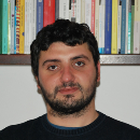
Mauro Mangia
non linear systems, compressed sensing, ultra wide band systems and system biology
Mauro Mangia received the B.S. and M.S. degree in electronic engineering from the University of Bologna, Italy, in 2004 and 2009 respectively and he received the Ph.D. degree in information technology from the University of Bologna in 2013. He is currently a post-doc researcher in the statistical signal processing group of the advanced research center ARCES, Bologna, Italy. In 2009 and 2012 he was a Visiting researcher at the École Polytechnique Fédérale de Lausanne (EPFL). His research interests are in non linear systems, compressed sensing, ultra wide band systems and system biology. He was recipient of the last Guillemin-Cauer best paper aword (2013) and he also receive the best student paper award at the International Symposium on Circuit and System 2011.
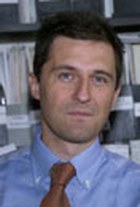
Marco Savoia
structural reliability, dynamic identification, composite materials, creep and damage of concrete, seismic engineering
Marco Savoia is Full Professor of Structural Engineering at DICAM, Faculty of Engineering of the University of Bologna (IT) since 2000, where he is teaching the course of Structural Engineering and Design of Structures, and he is carrying out his teaching and scientific activities. He obtained his PhD at the University of Bologna. He covered before the position of Assistant Professor at the University of Bologna (1992-1998) and Associate Professor at the University of Parma (1998-2000).
He has been Visiting Professor at the Virginia Polytechnic Institute (1990, 1997), the Texas A&M University (1993), the University of Virginia (1997), Florida Atlantic University (2003, 2004). He gave a number of seminars and courses in foreign universities on computational methods for composite structures and structural reliability.
He is author of about 250 scientific papers, more than 50 in international journals with referees. In the last ten years he is active in the research field of structures made or reinforced with composite materials, a topic where he has been reviewer of papers submitted for possible publication for about ten international journals. He has been member of the Scientific Committee of ICCST-1, ICCST-2, BBFS 2005, FramCos 2007 International Conferences, and Aimeta Conference in 2009. He organized the ANIDIS Conference of Seismic Engineering in Bologna in 2009 . He has been reviewer of more than 80 papers submitted to about 20 different international journals. He has been reviewer of some research proposals submitted to national and international organizations, such as NSF (National Science Foundation, U.S.A.) and FRD (South Africa).
Since 2004 to 2008, he has been member of the Scientific Commitee of the Center of Excellence on "Composites for innovative applications in civil engineering" of the Federico II University in Bologna, founded by Miur.
In 2006 he has been invited to be a member of the Academy of Science of Bologna.
He has been expert member of the C.N.R. (National Council of Research) National Commission for Codes for Reinforced Concrete Structures and that for Strengthening of Structures with innovative materials. In 2004 and 2005, he was responsible of two tasks in preparation of CNR Guide Lines on Strengthening with composite materials (DT200/2004) and on Fiber-Reinforced Concretes FRC (DT204/2006). From 2008, he is full member of that Commission. In 2004-05, he has been a member of National Council of Public Works.
Since 2001 to 2010, he is the Coordinator of the Structural Tests Lab of DISTART - University of Bologna. Since 2010 he is the Director of the Centre for Industrial Research Edilizia & costruzioni of the University of Bologna.
In 2007 he has been elected Coordinator of the Education program in Civil Engineering of the University of Bologna. He is coordinating the new study programs according to DM270/2004 and he proposed the activation of a new International Master course in Civil Engineering since 2009.

Fabiana Zama
Numerical regularization methods for Inverse Problems; Numerical Optimization methods. Numerical solution of partial differential equations. Parameter estimation models and algorithms in Time Domain NMR. Numerical methods in Magnetic Resonance Imaging.
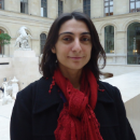
Jocelyne Elias
Network Optimization, Game Theory, Mobile and Wireless networks, and Wearable Technology.
Jocelyne Elias is a Senior Researcher (RTDb) since November 2019 at the Department of Computer Science and Engineering (DISI), University of Bologna. She has been an Associate Professor since September 2010 (Maître de Conférences with habilitation, HDR) at the Laboratoire d'Informatique PAris Descartes (LIPADE), the Computer Science laboratory of the Université Paris Descartes. She held the position of visiting professor at the INRIA DYOGENE team from September 2015 to August 2017 and was Senior Research Engineer at the Mathematical and Algorithmic Sciences Lab, France Research Center, Huawei Technologies from November 2018 to August 2019. She received the title of PhD in Computer Science from the Université Pierre et Marie Curie (UPMC), Paris, in July 2006, the Master of the UTT of Troyes, in 2003, and the Master in Computer Sciences from the Lebanese University of Tripoli in 2002. She authored more than 60 international journal and conference papers on wireless networks, optimization and game theory applied to networks. She is Associate Editor of the Computer Networks journal (Elsevier), and member of the technical committee of the Computer Communications journal (Elsevier).
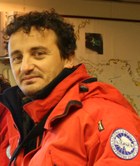
Marco Dubbini
Marco Dubbini is a Senior Researcher (RTDb) since May 2021 in Geomatics at the University of Bologna. From 2008 to 2021 he was a Technical Researcher and Adjunct Professor at the Geography section of the University of Bologna. Received in 2001 his Ph.D. in Geodetic and Topographic Sciences from the University of Bologna, where he also received M.SC. degrees in Civil Engineering in 1998. His research and work concern the field of Geomatics (Geodesy, Topography, Photogrammetry, Remote an Proximal Sensing) in applications regarding the monitoring and control of infrastructure, soil and territory, environmental and implementation of systems and analyzes concerning precision agriculture. Founding partner of innovative startup that produces patents and deals with the design and implementation of UAV systems, multispectral sensors and optimization of acquisition and data analysis.
Since 2002 is a member of Research Group of the PNRA (National Program of Antarctic Research) and he participated in 8 scientific expeditions to the Antarctic continent at the scientific bases of "Mario Zucchelli Station" in Victoria Land and "Dome Concordia" in the Antarctic plateau, for the study of Northern Victoria Land crustal movements.
Since 2017 he as member of the Editor Board of "Applied Geomatics", SPRINGER's international journal.